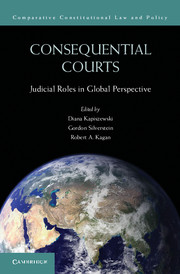Book contents
- Frontmatter
- Contents
- Contributors
- Introduction
- PART I EXPANDING JUDICIAL ROLES IN NEW OR RESTORED DEMOCRACIES
- Part II EXPANDING JUDICIAL ROLES IN ESTABLISHED DEMOCRACIES
- 6 Courts Enforcing Political Accountability
- 7 The Dutch Hoge Raad
- 8 A Consequential Court
- 9 Judicial Constitution Making in a Divided Society
- 10 Public Interest Litigation and the Transformation of the Supreme Court of India
- 11 The Judicial Dynamics of the French and European Fundamental Rights Revolution
- 12 Constitutional Courts as Bulwarks of Secularism
- PART III FOUR “PROVOCATIONS”
- Conclusion Of Judicial Ships and Winds of Change
- Index
- References
11 - The Judicial Dynamics of the French and European Fundamental Rights Revolution
Published online by Cambridge University Press: 05 April 2013
- Frontmatter
- Contents
- Contributors
- Introduction
- PART I EXPANDING JUDICIAL ROLES IN NEW OR RESTORED DEMOCRACIES
- Part II EXPANDING JUDICIAL ROLES IN ESTABLISHED DEMOCRACIES
- 6 Courts Enforcing Political Accountability
- 7 The Dutch Hoge Raad
- 8 A Consequential Court
- 9 Judicial Constitution Making in a Divided Society
- 10 Public Interest Litigation and the Transformation of the Supreme Court of India
- 11 The Judicial Dynamics of the French and European Fundamental Rights Revolution
- 12 Constitutional Courts as Bulwarks of Secularism
- PART III FOUR “PROVOCATIONS”
- Conclusion Of Judicial Ships and Winds of Change
- Index
- References
Summary
This chapter analyzes an important and complex development that is currently playing out at the intersection of the French and European judicial systems: a whole series of courts (and court-like institutions) that had little or nothing to do with “judicial review” are now in the midst of a mad scramble to master and direct the development of fundamental rights jurisprudence. This chapter traces this development and explains how the advent of the European Court of Justice and the European Court of Human Rights has led to an intense interinstitutional competition between the French and European High Courts, a competition in which fundamental rights have served both as the opportunity that triggered this competition and the preferred means to engage in it.
Part of the story of the dramatic rise of fundamental rights is undoubtedly social and intellectual in nature. At the domestic level, France has been increasingly fragmenting along pluralistic lines. This fragmentation has posed ever greater challenges to French republicanism, which has traditionally stressed the unitary nature of both “the general will” and “general interest.” The result has been a marked rise in individual- and group-oriented pluralism increasingly expressed in fundamental rights terms.
- Type
- Chapter
- Information
- Consequential CourtsJudicial Roles in Global Perspective, pp. 289 - 310Publisher: Cambridge University PressPrint publication year: 2013



